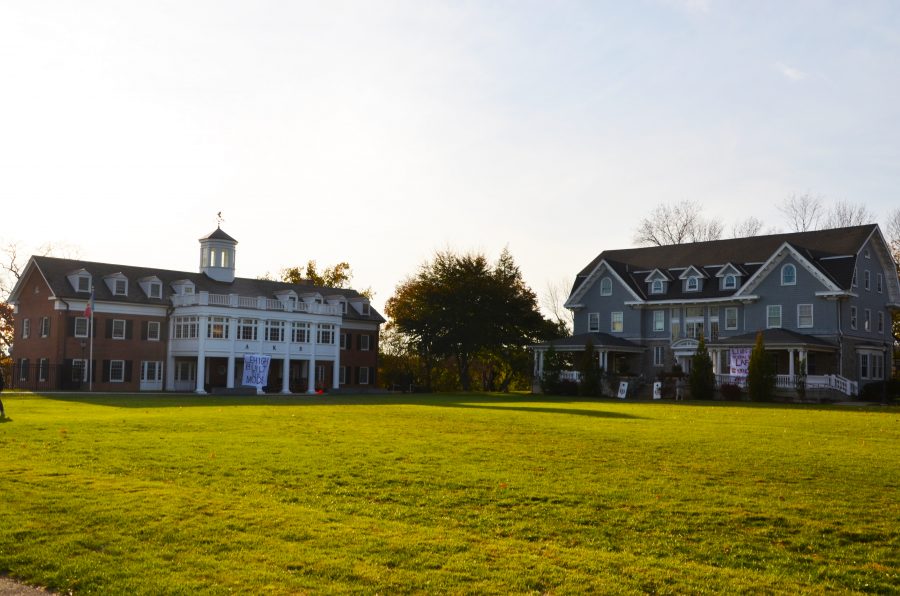After rising COVID-19 cases kept the college at operational level two last week, a handful of positive tests were linked to the Phi Psi house and one positive test was linked to the Zeta Psi house, according to several sources inside each fraternity.
Two cases have also been linked to the Delta Tau Delta fraternity, who do not have a house on campus. Several positive cases have also been tied to the Kappa Kappa Gamma and Alpha Phi sororities according to members in each organization, although it’s unclear if the cases are linked to their respective houses.
It also remains unclear if the cases tied to Greek life are commensurate with the number of cases tied to the overall student body. There were 22 active student cases as of Wednesday night, 16 of which were recorded positive last week. Due to privacy concerns, no identifying information is released when positive tests are recorded.
No fraternity presidents responded to a request for comment for this article except for Delta Kappa Epsilon President Hank Scheffler ’22, who responded to questions via email. Some sorority presidents did not respond, while others said they would respond and ultimately did not. Pi Phi President Sam Schram ’22 said she declined to comment at this time.
Scheffler denounced unapproved social events and emphasized that all of the Greek groups operate differently, and therefore the “generalization of ‘Greek life’ as one mind” is damaging and further perpetuates “the idea of in-groups and out-groups.”
“We are all unique and are taking different approaches to preventing outbreaks,” he said. “Any unapproved events, whether it pertains to Greek life or other organizations, will ultimately worsen the atmosphere at Lafayette and prolong us returning to any normalcy.”
All Greek groups submitted mitigation plans at the beginning of the semester, according to Director of Student Involvement Vanessa Pearson.
“[The plan] addressed how they would operate their houses, including dining facilities for those that have them, their protocols for cleaning, social distancing, and monitoring, and their plans for how they would conduct activities aligned with the college’s operational levels,” Pearson said. “As with all members of the campus community, reports regarding alleged violations will be investigated and addressed through the conduct system and sanctions may be applied to individuals or the organization.”
Pearson has been on an island in the student involvement office since last February, when the former advisor to fraternities and sororities Dan Ayala resigned. The position has still not been filled, and will not be for several more months.
“We will be hiring a Greek Advisor, which was held vacant this year,” Pearson said. “In line with the College’s hiring freeze guidance, a search will be launched after Feb. 25 with an anticipated hiring date of July 1.”
Current Panhellenic Council President Caitlyn Dempsey said they worked closely with Pearson to ensure that the recruitment process and “bid day” aligned with the college’s guidelines. The Panhellenic Council is the governing body for sororities at Lafayette.
“We were able to help guide vice presidents of recruitment through the process as best as possible and provide a lot of proactive guidance in regard to plans for the semester,” Dempsey said. “We also, as previously mentioned, posted our list of resources for COVID guidelines and links on our Instagram as well as set strict expectations for what we expect of students in Greek life.”
Due to the communal nature of the living spaces and large social networks, Greek houses may be at particular risk to viral spread. The administration has noticed “more students moving between groups when the social networks are larger,” according to Vice President for Campus Life Annette Diorio.
“There are some reasons that COVID-19 tends to spread, most notably having more unique social contacts,” Diorio said. “Living together may be a slightly higher risk but that would relate more, I would imagine, to how common spaces are being used rather than simply living together in a shared space.”
Former Panhellenic Council President Sandi Manfreda ’21 agreed, and said that the social nature of the groups would inevitably lead to more cases on campus.
“I think the biggest aspect of Greek life culture, and why people want to join, is for that social aspect,” Manfreda said. “[When] you’re crossing social circles, that can definitely lead to COVID.”
Manfreda also noted that the drinking culture within many Greek groups could further increase the risk of transmission.
“The Greek community is one of the most social communities on campus in a sense of partying, alcohol culture, and all that,” she said. “In those environments, you’re not wearing masks, you’re getting drunk, and you’re not really caring about the rules.”
This is not the first time that virus cases have been tied to the Greek community. An outbreak in October was linked to unapproved social events allegedly held by several Greek organizations, causing a spike of cases and putting nearly 80 students in quarantine.
Virus cases linked to Greek life have also fueled the abolition movement, as fraternities and sororities are in more danger now than they have been in years. Scheffler seemed to be acutely aware of this.
“On top of just a moral duty to not spread coronavirus, we all understand the atmosphere directed towards Greek life,” he said. “[We] are committed to not assisting those who would like to see Greek life abolished.”
Disclaimer: Andrew Hollander is a member of the Delta Tau Delta fraternity, and did not contribute reporting about events related to that group.





















































































































